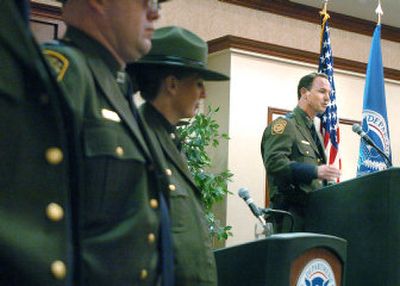More agents posted at U.S.-Canada border

The federal government increased the number of agents along the Canadian border in the wake of the Sept. 11 terrorist attacks, but it is unlikely to ask volunteer citizen groups to help with patrols, a top federal official said Thursday.
“The border itself is a potentially dangerous place,” said Robert Bonner, U.S. Customs and Border Patrol commissioner. “Law enforcement should be left to law enforcement professionals.”
The number of agents for the Spokane sector, which runs from the eastern slope of the Cascades to the Continental Divide in Montana, has tripled to about 150 agents, Bonner said. It could grow again next year, if Congress adds 1,500 agents to the nation’s total of 11,000.
Bonner and Border Patrol Chief David Aguilar were in Spokane for the ceremonial installation of the Spokane sector’s new chief agent, Robert Harris. In a ceremony with military overtones such as an armed color guard and the passing of a unit flag, Harris officially took control of a sector responsible for more than 300 miles of border.
A veteran of more than 20 years with the Border Patrol, Harris was formerly the assistant to Aguilar in Washington, D.C. His father, two uncles and brother also are border patrol agents, and his wife, Rene, serves as the customs attaché in Mexico City.
Spokane district agents were also issued new badges with the insignia of the Homeland Security Department, which took control of the Border Patrol and other agencies when it was formed after the Sept. 11 terrorist attacks.
Bonner told the agents they are America’s frontline against new attacks from foreign terrorists.
“They’ve got to get past us. We will do everything in our power to prevent that from happening,” he said. “We can never secure America until we secure our borders.”
But with thousands of miles of border to watch, both to the north with Canada and to the south with Mexico, those agents are spread thin. Federal officials in Spokane have noted that drug smugglers who cross the Canadian border usually carry bear spray because they are more likely to encounter a grizzly than a border agent.
That may be, Bonner acknowledged. “But they are more likely to encounter a border agent than they were a couple of years ago.”
Last month, Bonner created a stir when he told reporters during an interview in Los Angeles that the agency would consider forming something like a Border Patrol auxiliary with citizen volunteers. Earlier in the year, federal officials had been critical of a group of civilian volunteers with the Minuteman Project who patrolled the U.S.-Mexican border in an effort to stop illegal immigrants.
On Thursday, Bonner said the agency will continue to rely on citizens who live at or near the border to serve as “eyes and ears” for suspicious activity. But as for relying on citizen volunteers for patrolling remote areas: “I don’t think that would be the way to go.”